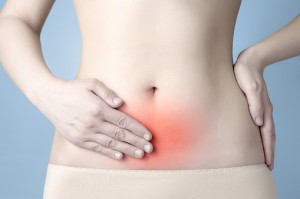IBS Awareness Month
- Sharon Cole

- Apr 3, 2017
- 3 min read
IBS and reflexology:
What is IBS?
Irritable Bowel Syndrome (IBS) is a name given to a longstanding illness consisting of abdominal pain and discomfort that cannot be explained by any other know disease. Symptoms can vary from person to person, but often cover:
Abdominal cramps
Bloating
Diarrhoea or constipation
This can lead to other symptoms as the toxins in the body build up, suffers often report:
Tiredness
Nausea
Heartburn or indigestion
Backache
Headaches
Muscle pains
Anxiety
Depression
If you have any ‘Red Flag’ symptoms, these could indicate something else, so if these persist, check it out with your GP
Bleeding on going to the loo
Weight loss with no explanation
Persistent fever
Ongoing change in bowel habits, without any other cause (Stress, change in diet or medication)
There is no specific cause, and most people tend to suffer if they have a sensitive bowel and experience prolonged periods of stress or trauma, or major changes to their diet. It should also be noted that reducing stress and changing diet can also help suffers to manage the condition.
To remain fit and healthy, we should all be eating a balanced diet consisting of natural ingredients; meat, fish, fruits and vegetables and cutting out as much processed food and refined sugar as possible. However, people with gut sensitivity tend to find certain foods can trigger an attack. It may be worth keeping a food diary for a few months to see what food groups tend to trigger your attacks. Some general ideas are:
Reduce your intake of pulses (peas, lentils and beans) as these can be difficult to digest and cause bloating and gas.
Apple and pears can also be difficult to digest and I would avoid these and stick to citrus fruits instead.
Reduce your intake of milk – modern milk processes strip the goodness out of milk. However, there are plenty of milk substitutes on the market today you can try (Almond, Rice and Coconut are my favourite choices)
Reduce your intake of fatty and processed meats like sausages.
Avoid hot chilli spice and strong coffee
Drinks are also important, it’s best to stay simple, avoiding the sugary, fizzy processed drinks, which can often cause bloating and are full of toxins and empty calories. Also avoid Alcohol, and limit your caffeine intake from tea and coffee. Opt for water, fruit teas and juices.
As well as watching what you eat, you also need to consider ‘how’ you eat. Many busy and stressed people rush around, skip meals, or cram unhealthy food in late at night to compensate. If you are anxious or frustrated when you eat, the high emotions will upset the gut, and makes things worse.
Be mindful about your eating patterns, and try to make small changes until your symptoms are reduced. Make time for 3 meals a day, don’t skip meals, especially breakfast. Try not to eat on the go, sit down at the table and chew your food slowly and mindfully. Take time to prepare and cook your own meals/lunches, savour the flavours and enjoy your labours. Avoid arguments at meal times, or anything else that can flare up negative emotions, like TV programs. Switch it off and spend the time with friends and family.
How Reflexology can help
Reflexology can help to repair some of the damage. Nerve endings in the feet which correspond to the tissues and organs responsible for digestion can be stimulated, relaxed and tension removed. The overall effect of Reflexology is one of relaxation, and therefore stress related illnesses respond really well to treatment.
When working with people who suffer with IBS I tend to work through the areas of digestion, small intestines, transverse colon and descending colon in the same direction as the food moves through the digestive system to help with absorption of nutrients and elimination of waste matter. This can ‘wake up’ a lazy bowel to ease constipation, or help to relax a tight bowel to stop the urgent elimination associated with diarrhoea.
Other reflex points associated with stress such as the adrenals, pituitary and solar plexus can also be worked to help relax the body and control the hormones, which can leave us stressed and exhausted.
For more information on how Reflexology can help you, call or Email Sharon Cole at Waterlily Therapies (waterlily.therapies@sky.com).
Related posts:








Comments